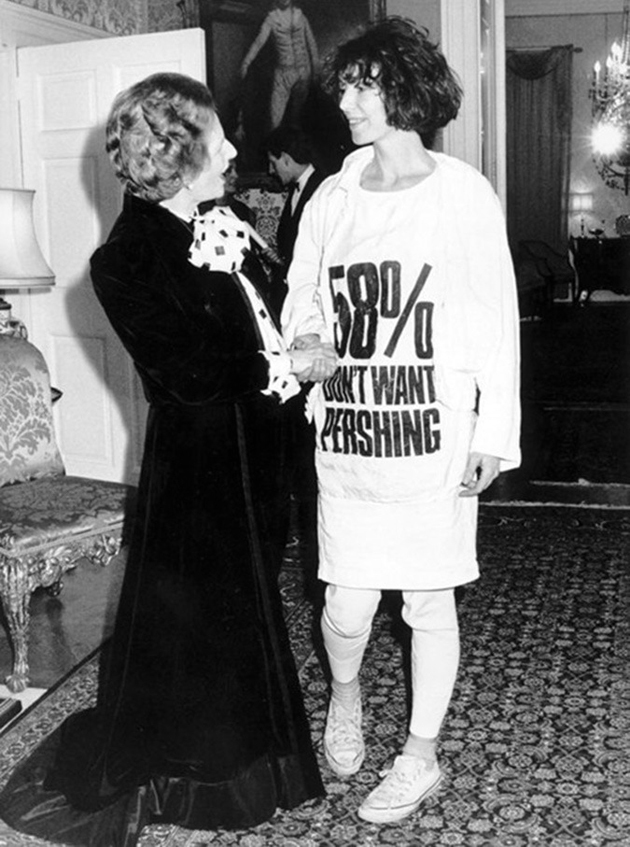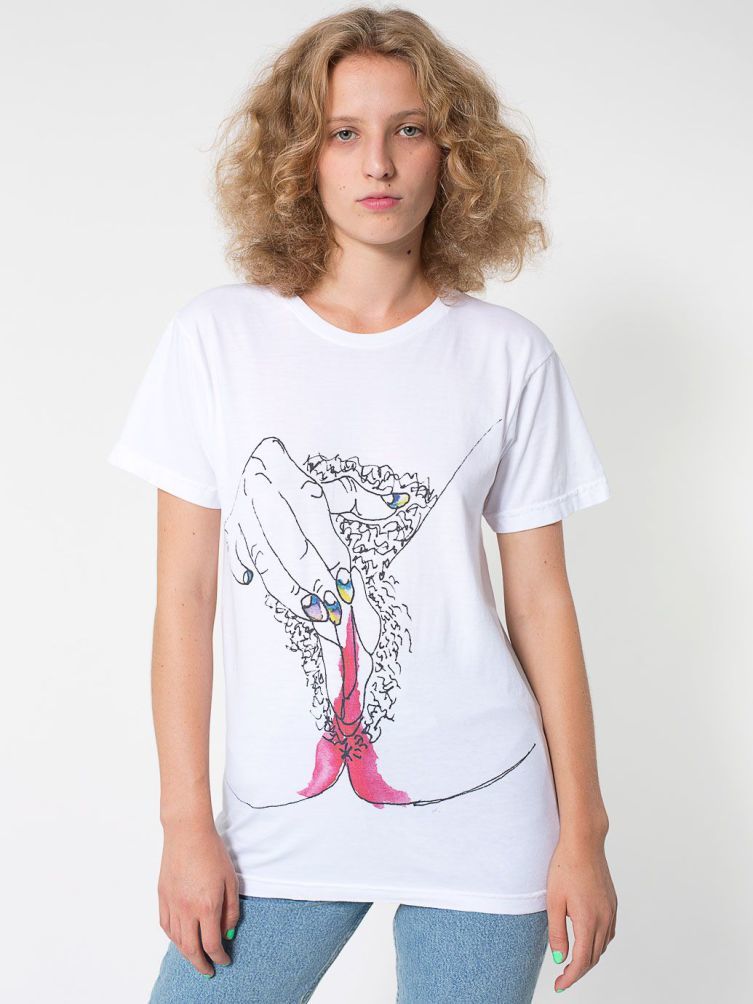On Monday, Anna Lehane, a high school senior from Dallas, wore a “GRAB MY PUSSY, I DARE YOU” (caps hers) T-shirt to a Trump rally in Pennsylvania. She told a reporter it was her “civic duty.”
In previous decades, it has been people’s civic duty to roll their eyes at slogan T-shirts, in the same way you might at a “☾oe✡ist” bumper sticker or Michael Jackson’s “Earth Song.” But in the mid-2010s, when people need to wear the word “feminist” on their underwear as a daily reminder of the fight for gender equality, and when the possibility of our country electing a president who boasts about groping women is all too real, political T-shirts aren’t just acceptable, they’re admirable.
Luckily, they’re often also nice to look at in 2016. See: New York-based photographer David Brandon Greeting’s update of the classic Calvin Klein T-shirt, in which the logo stands instead for Clinton Kaine. It’s a beautiful win-win: all proceeds from sales of the 100 limited-edition shirts go to Black Lives Matter and the camps of protesters fighting the Dakota Access Pipeline, and wearers will organically publicize Hillary’s campaign while out and about looking attractively politically engaged.
And Greeting’s isn’t by any means the first fashion-forward political T-shirt. British designer Katharine Hamnett has been producing her iconic consciousness-raising slogan tees since 1983. Her signature all-caps screen prints have included “Education not missiles,” “Use a condom,” and “Vote tactically.” In 1984, she wore a T-shirt protesting the stationing of US Pershing missiles in the UK while shaking Margaret Thatcher’s hand at 10 Downing Street.

“I wanted to put a really large message on T-shirts that could be read from 20 or 30 feet away,” Hamnett told The Guardian. “Slogans work on so many different levels; they’re almost subliminal. They’re also a way of people aligning themselves to a cause. They’re tribal. Wearing one is like branding yourself.” Last year, she allowed a version of her famous slogan “Choose life” to be used on T-shirts benefitting the humanitarian organization Help Refugees. And next month – on the back of her blossoming collaborative friendship with Kanye West in 2015 and a collection with British brand YMC – she plans to re-launch her own brand online.
Related: Fashion’s eco warrior Katharine Hamnett is Kanye’s main muse
Before Hamnett, there was Vivienne Westwood. In the 1970s, the eco queen made politically confrontational T-shirts with her then-husband Malcolm McLaren to sell at their legendary London store SEX. McLaren called a T-shirt bearing an upturned crucifix and the word “destroy,” “the ultimate punk rock T-shirt.”
The power of the slogan T-shirt lies precisely in its disruptive punk potential – its ability to cause havoc simply by existing in a certain time and place. And within the last five years, a wave of young people have tapped into that power, using the humble tee as a platform for starting overdue or undervalued social conversations.
In 2013, Petra Collins and artist Alice Lancaster emblazoned a T-shirt with an illustration of a masturbating menstruating woman for American Apparel. It triggered a debate about representations of the female body and helped take the concept of “period power” mainstream. This past February, 16-year-old student Taylor Victor was sent home from school for wearing a T-shirt printed with “Nobody Knows I’m a Lesbian”; she was told by her vice principal that she wasn’t allowed to publicize her sexuality with her clothing. Victor filed a report with the American Civil Liberties Union, which then sued her school in federal court. She won herself a settlement and raised important questions about self-expression in schools.

Earlier this year, a law professor at an unnamed school received complaints from students about her “Black Lives Matter” T-shirt. “We do not spend three years of our lives and tens of thousands of dollars to be subjected to indoctrination or personal opinions of our professors,” her students wrote in an anonymous letter. The professor’s response went viral in July, helping spread awareness of the Black Lives Matter movement during a summer when police violence against people of color continued to reach new levels.
In many of these instances, the shirt wearers were below voting age. Turning the T-shirt, a traditional staple of teen mall culture, into a political tool is one of the most visible and powerful forms of political expression available to those without the power to vote.
But as the godmother of the political T-shirt, Katharine Hamnett, told i-D last year, “T-shirts are great, but they don’t change anything, really. Unless you take constructive action in other areas of your life, just wearing a T-shirt actually isn’t going to do anything.” In other words: please do buy a “GRAB MY PUSSY, I DARE YOU” T-shirt but also – if you’re legally able – get out and vote on November 8.
Credits
Text Alice Newell-Hanson
